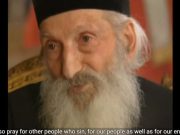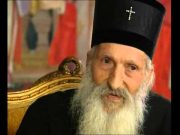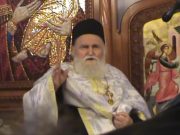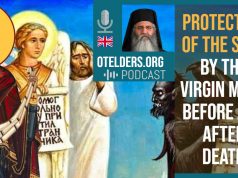In this episode, Metropolitan Neophytos of Morphou answers the question: “Can the living help the dead?”
This English translation of the sermon of His Eminence Metropolitan Neophytos of Morphou during the 2nd “Lighting the lighter of the saints” Spiritual Dialogue Meeting with His Eminence, 14 April 2019, was provided by the ‘Metropolitan Neophytos of Morphou Homilies’ YouTube channel and was presented for otelders.org by Porphyrios from the ‘Orthodox Treasures YouTube Channel.’ The meeting was hosted by the Renewal Committee of the Church of Panagia Kataphygiotissa in Platanistasa and took place at the event hall of the Holy Church of God’s Wisdom (Agia Sophia) in Strovolos, Cyprus.
Met. Neophytos:
[His Eminence]: Now, regarding the next question, which isn’t just one, there are many. This reminds me of the [Greek] proverb that says, “Now that we have found a priest, let’s bury a few more.” Do you know what [the large number of questions this] implies? It suggests that this is a work all bishops should undertake, instead of giving homilies of our own inspiration. This is the right way. It’s really crucial in our time.
I don’t think we’ll be able to answer every question. Still, my experience in Akaki has taught me that often, answers emerge through the stories I share. Indeed, “there is no repentance in Hades” for the souls of the departed. However, the souls that cannot help themselves [in hell], because they are rooted in malice, envy, rivalry or avarice, or sensuality. — The soul is immortal, only the body dies. — Thus, whatever pathology the soul fosters in in its earthly life, it carries it into the next. For example, a pathologically envious person won’t suddenly become gentle and tolerant in the next life. Their pathology only grows worse there.
Yet how can those in Hades be aided? What the souls themselves cannot achieve on their own [because of where they are], we, the living, can [accomplish for them]. Because we are still “free” people. Because we are still within the earthly Church. We are living cells of Christ’s Body. That’s a great privilege to have! Whether through the Sarantaleitourgon (forty-day liturgies), whether by giving names for commemoration to priests at the prothesis and the liturgies, whether through secret acts of charity – and I cannot stress this enough – they must remain hidden. No one should know. No one!
Recently, I mentioned Zoe Laskari, the [famous Greek] actress. Everyone was looking at her [beautiful] feet, but she also had a heart. She performed acts of charity in secret. She is in heaven now. My friend, the monk I mentioned earlier, saw her [there]. Thus, our help extends beyond merely “improving” a soul’s state, so to say, in the afterlife. This isn’t just about offering comfort — that’s a Roman Catholic dogma. The Church’s experience, [revealed] through the lives of the saints, clearly affirms that: “The effective, fervent prayer of a righteous man avails much” [James 5:16]. The prayer of a righteous man can even deliver a soul from hell.
Of course, there are those who initiated their repentance in this [earthly] life, but died before completing it. For them, Christ has “a special arrangement,” granting them the chance to complete their repentance in the next life. Think how merciful our God is! This man of God I mentioned earlier, without me telling him, – he lives in Greece, I’m in Cyprus [and though I never told him] – he saw how I perform the Liturgy. And he told me, “You are having a good time, Neophytos. “You serve such beautiful Liturgies with your deacons “in those nice small villages, you go to. “But why do you always commemorate: “Evmenios, Sophronios, Elpidios, Germanos, Bessarion, Damascenos?” while holding the Holy Things.
These are names of saints I’ve encountered in my life who have helped me a lot and have not been canonized by the Church yet. I commemorate them out of gratitude. I also commemorate Metropolitan Pavlos of Kyrenia (✝2011), who requested this of me when I visited him for the last time. And he [my friend the monk] told me, “My bishop, all these people you commemorate are in heaven. “Some of them are even saints!” And he told me which are in heaven and which of them are saints. Know that being in heaven and being a saint are two different things. A saint partakes extensively in the glory of God — in the Light, we spoke of before. Those in heaven [partake] a bit less.
[He instructed me]: “Commemorate so-and-so “who didn’t complete their repentance [while on earth].” And then he told me specific names of hierarchs, priests, laity, even of members of my family and other Cypriot Church figures I’ve met. Of course, I won’t share their names. He told me to commemorate these certain people. And so I do. However, I told him, “I cannot obey you completely in this, “for if I speak these names aloud, “people will recognize [who they are].” But I do commemorate these people in secret at the prothesis. I assure you with absolute certainty that memorial services, the commemorations — to use the precise ecclesiastical term — do not merely offer some help, but can actually deliver souls from hell.
There was a priest suspended by his bishop because he was drinking. The bishop told him, “Father, stop drinking. Your behaviour is scandalizing people.” The priest answered, “I can’t. “I won’t lie to you, I like drinking, “I have some personal issues, “I’m an alcoholic.” The bishop said, “If you are not going to try, “then I am going to suspend you for three months.” It’s very easy for us bishops — because of the power we have — to behave cruelly at times assuming that we are correcting people. A three-month suspension means that the priest can’t perform the Liturgy for that time. [Later,] the bishop returned to his diocese and what is it that he witnessed? The diocese was full of souls from different eras. “Who are you?” he asks them. “We are the people, [the names of which], the priest you suspended, commemorates. “Who is going to commemorate us now?”
“But I had to suspend him,” he said, “to bring him to his senses.” “My bishop, when did you ever fall on your knees to pray for your priest?” That truth cuts deep. The same goes for you and your children. Unless you’ve knelt until your knees bleed, don’t you dare punish them. Otherwise, the temptation they suffer will come right back at you. This is why you should commemorate people. The departed are greatly helped by this.
And I will finish with this, even though I’ve already said a lot, I will share what St. Paisios once told me. He told me: You should divide your prayer in three parts. Let’s assume that my prayer takes half an hour. Pray ten minutes for yourself; either with a prayer rope or your own words. Then pray another ten minutes for the living in need; the sick, the divorced, drug addicts, family, friends, or even enemies – especially those you resent. You’ll ask [yourself], “Who do I have a grievance against?” Let’s say, Giota [for instance]. [Then pray], “Lord Jesus Christ, have mercy on Giota.” “And have mercy on me too.” Continue until your heart softens toward her. The grievance reveals whom my heart has a problem with.
For the final ten minutes, after you’ve prayed for yourself and the living, always pray for the departed. Saint Paisios also told me, “Do you want me to tell you a secret of mine? “I don’t begin with praying for myself or the living. I start with the departed. “When I want to summon my nous, “I start by commemorating names of the departed, “and I pray for them afterwards. “I feel such contrition. I feel that they are aided and comforted and illumined where they are — that afterwards I pray even better for myself and for the living.” The prayer for the departed constitutes half of our spiritual life.
Consider how much time we clergy devote to them in the Church. A lot! Do you know whom the Church commemorates first among the departed? The Panagia. As soon as the consecration of the Holy Gifts takes place, we say, “Especially for our most holy, pure Theotokos…” and then the chanter begins chanting, “Axion Esti” (It is truly meet). This “Especially for our most holy, pure Theotokos…” signifies that above all, even above the prophets and teachers, we commemorate the Theotokos. The Theotokos “needs” this, and I say “need” as a figure of speech. The Divine Liturgy is such a great issue, because it’s the very presence of Christ, His bodily presence, as a matter of fact. So that [even] the Theotokos desires to be incorporated into the resurrected Body of her Son, and her God, and our God.

 Română
Română




























![Spiritual Tears: A Profound Journey with Metropolitan Athanasios of Limassol [Podcast] otelders Podcast Tears In God](https://otelders.org/wp-content/uploads/2023/10/otelders_podcast_tears-238x178.jpg)






